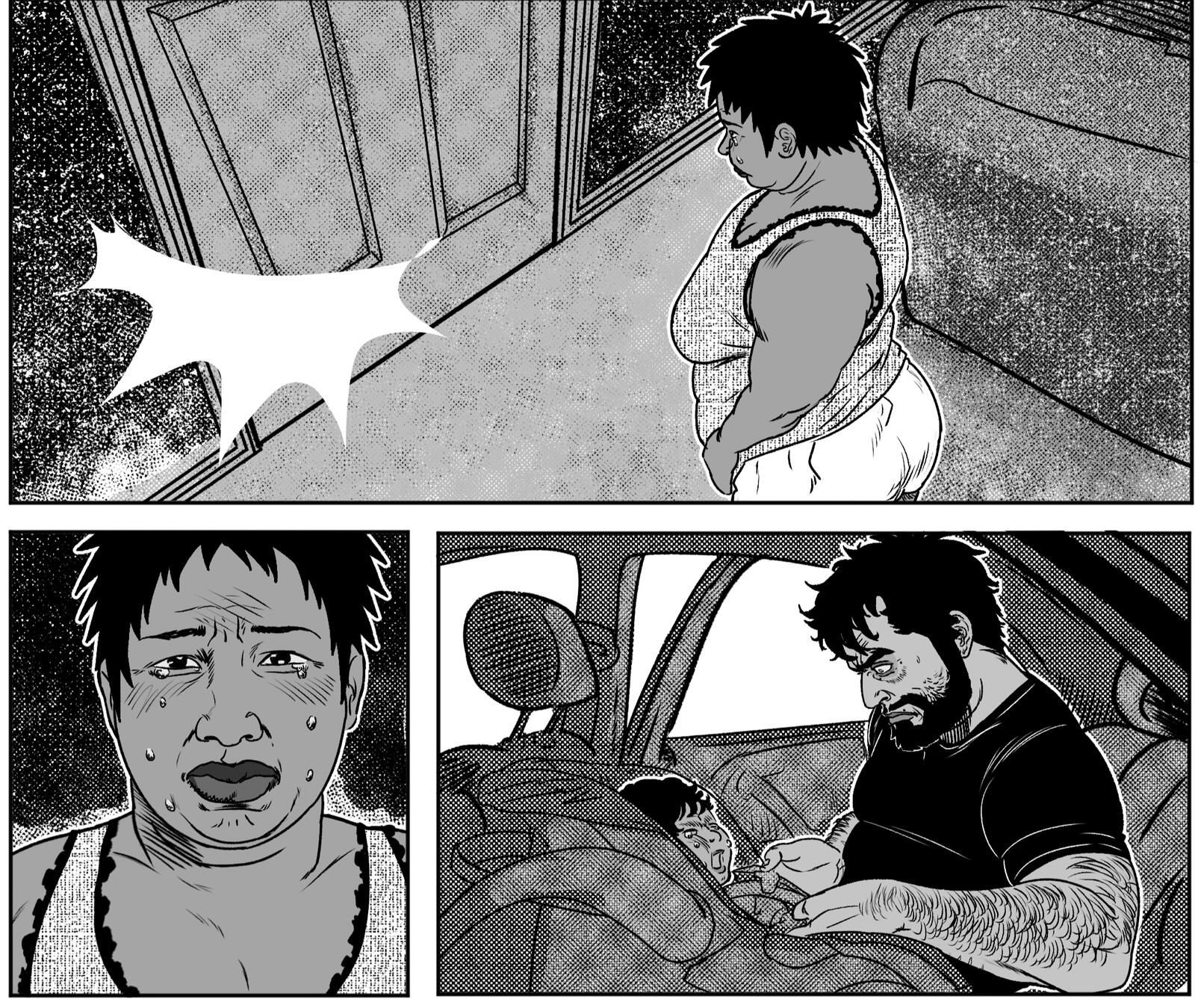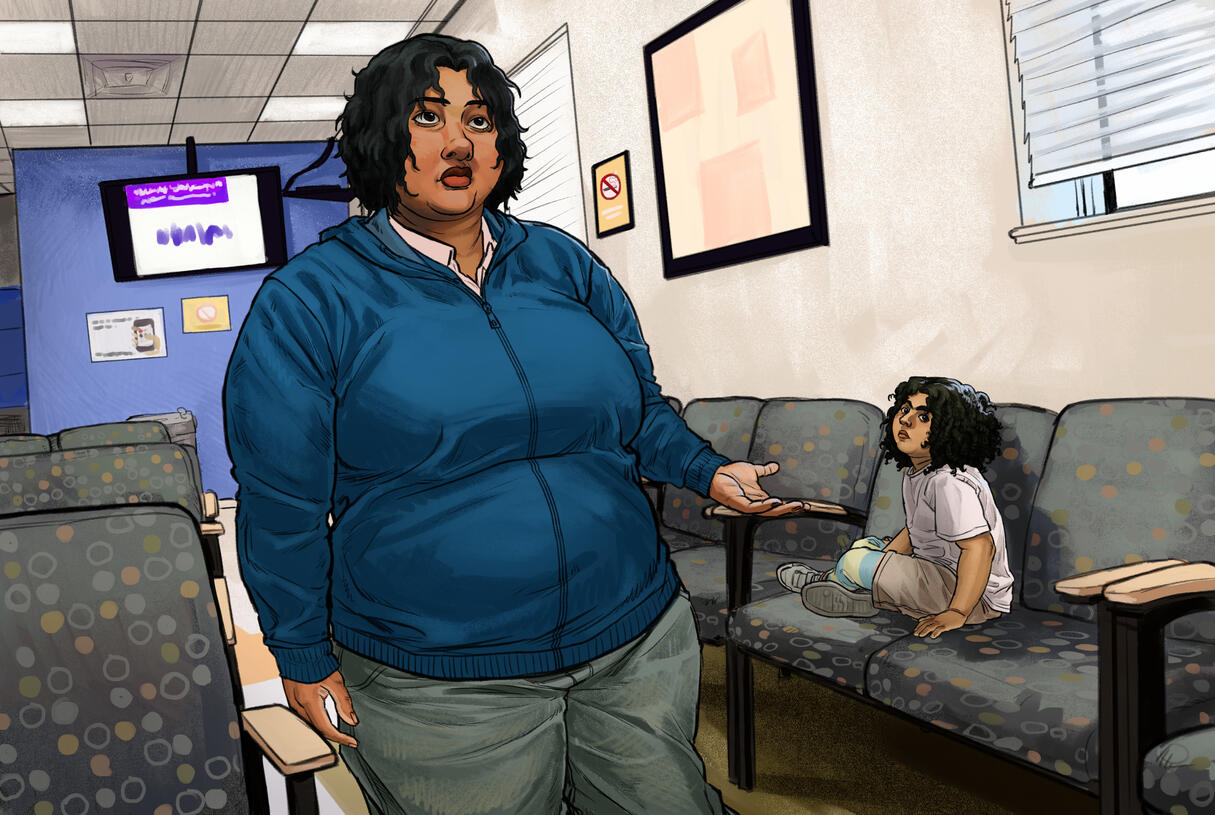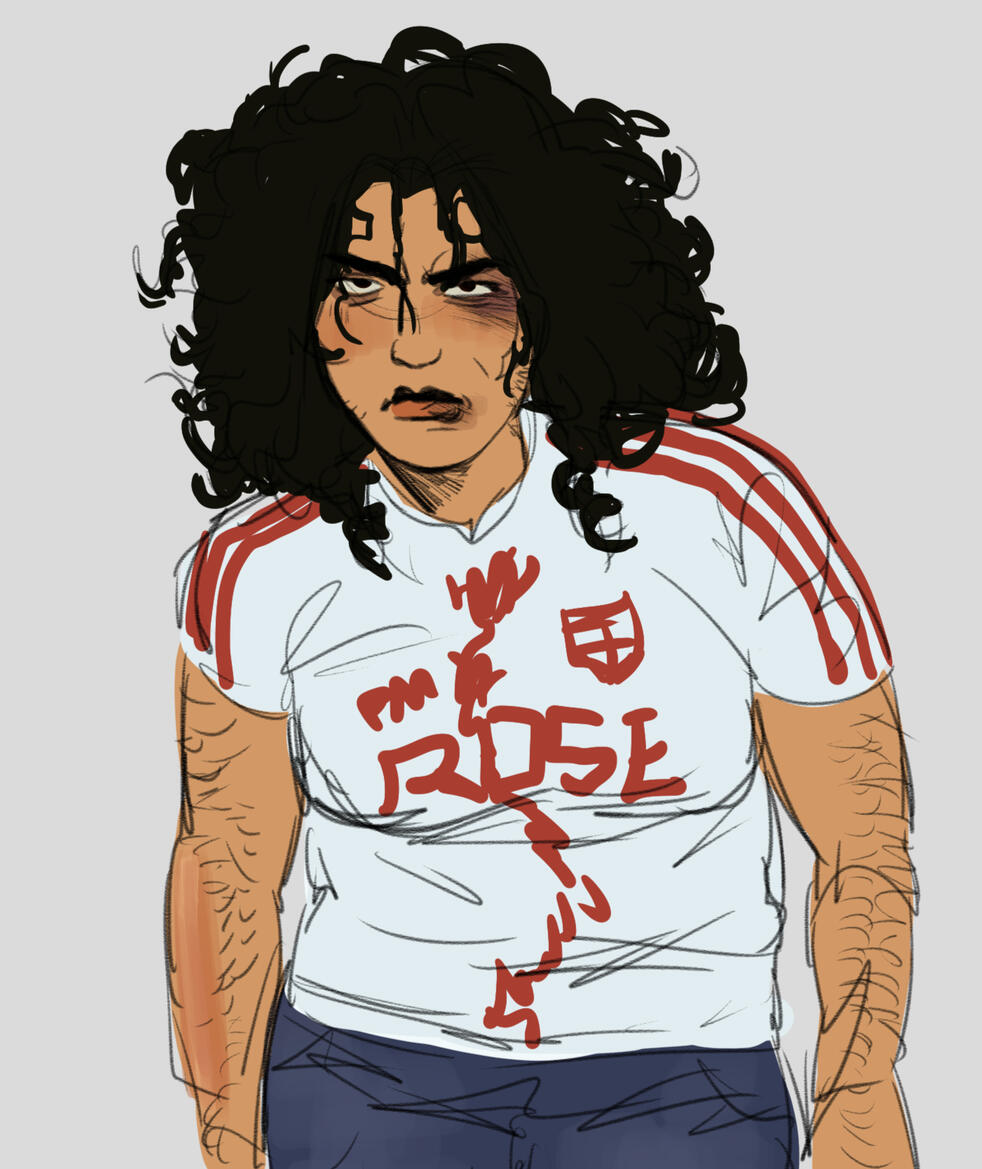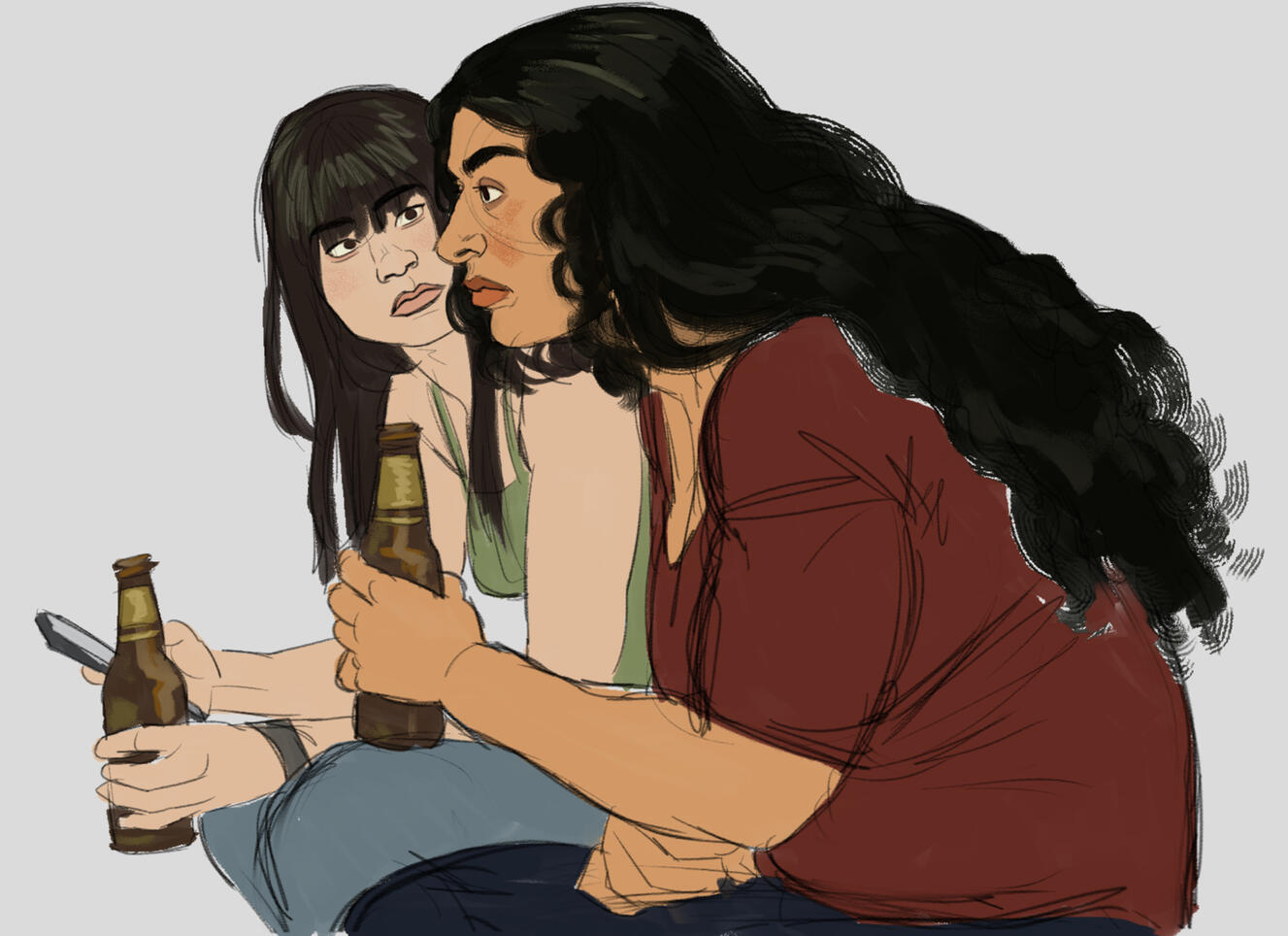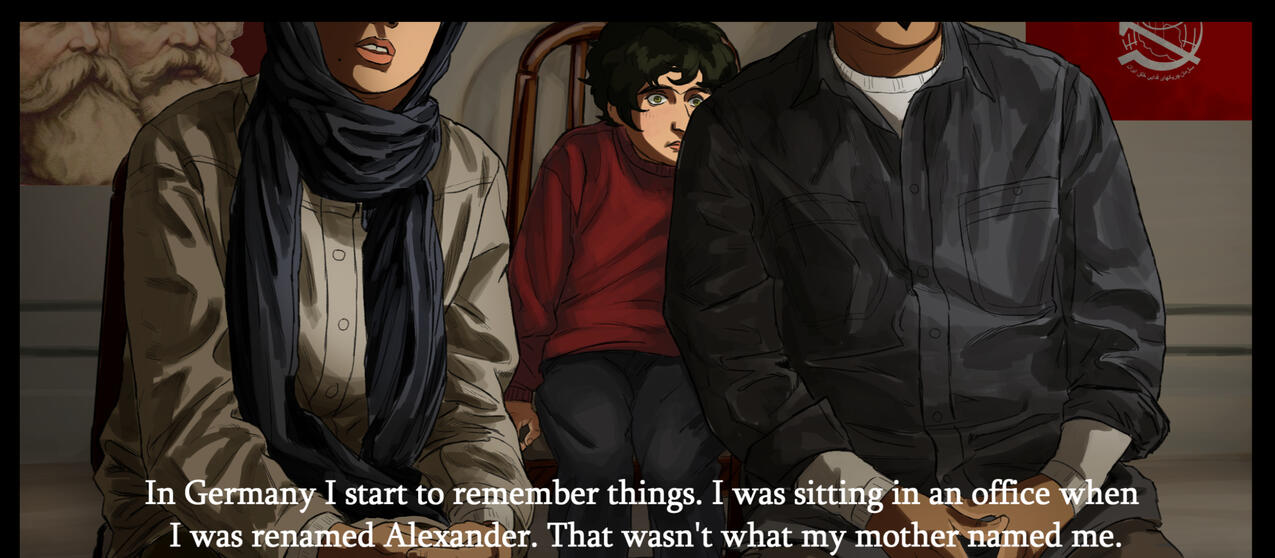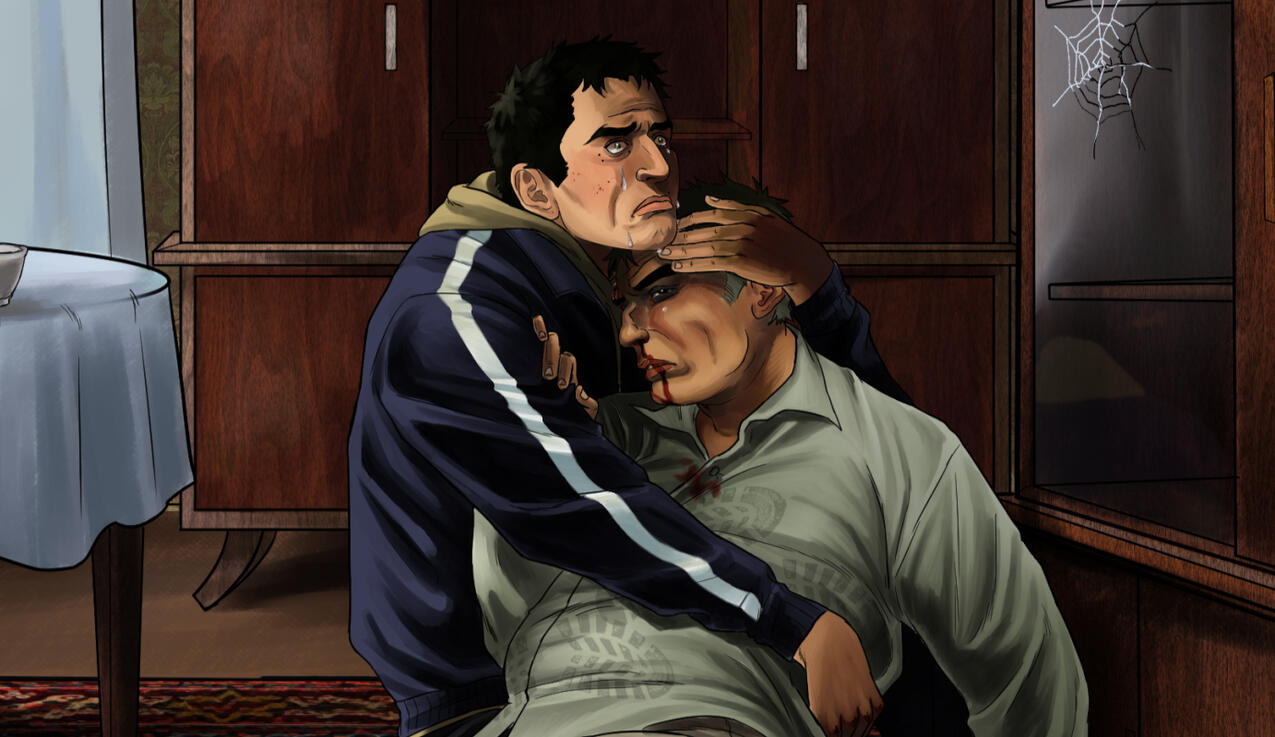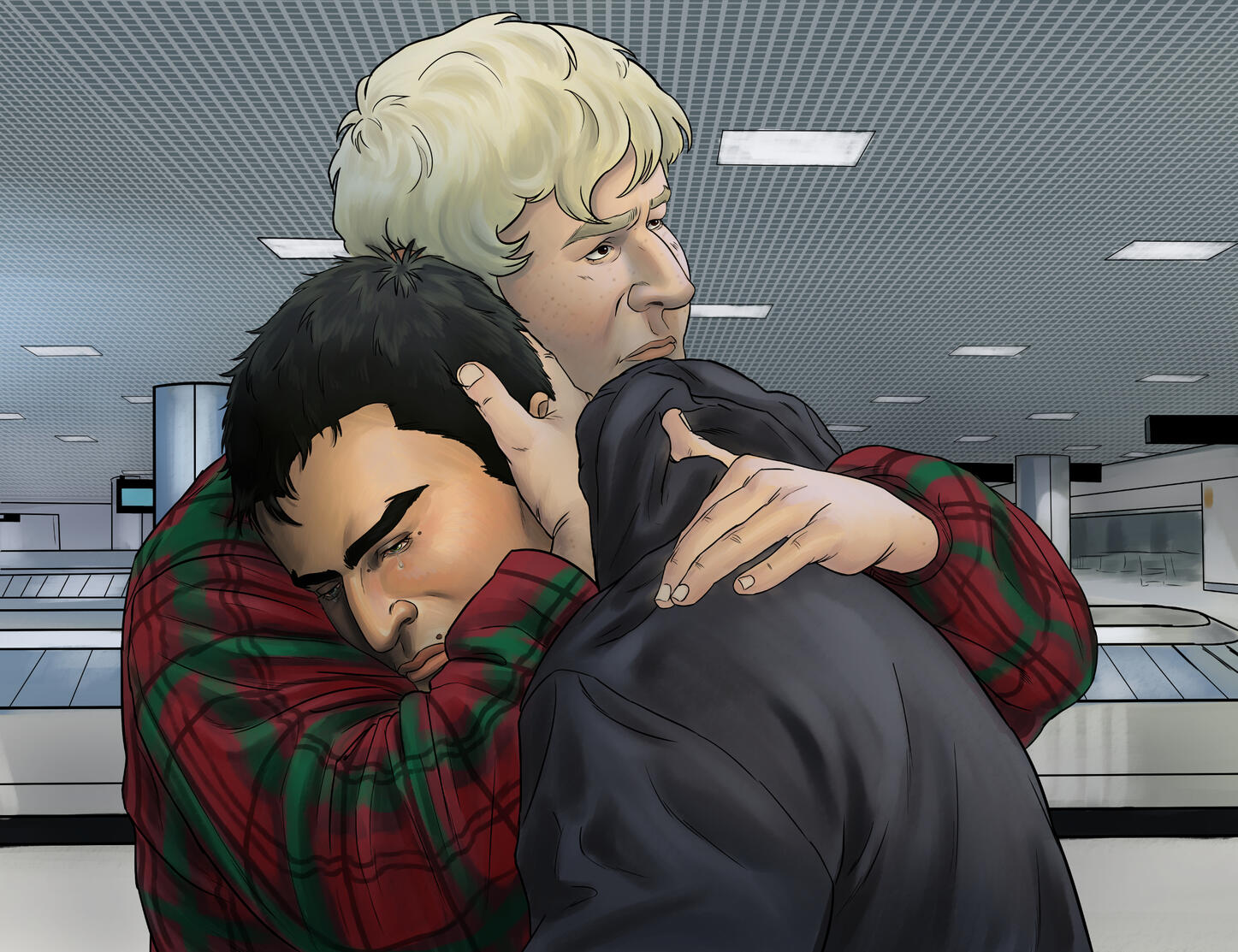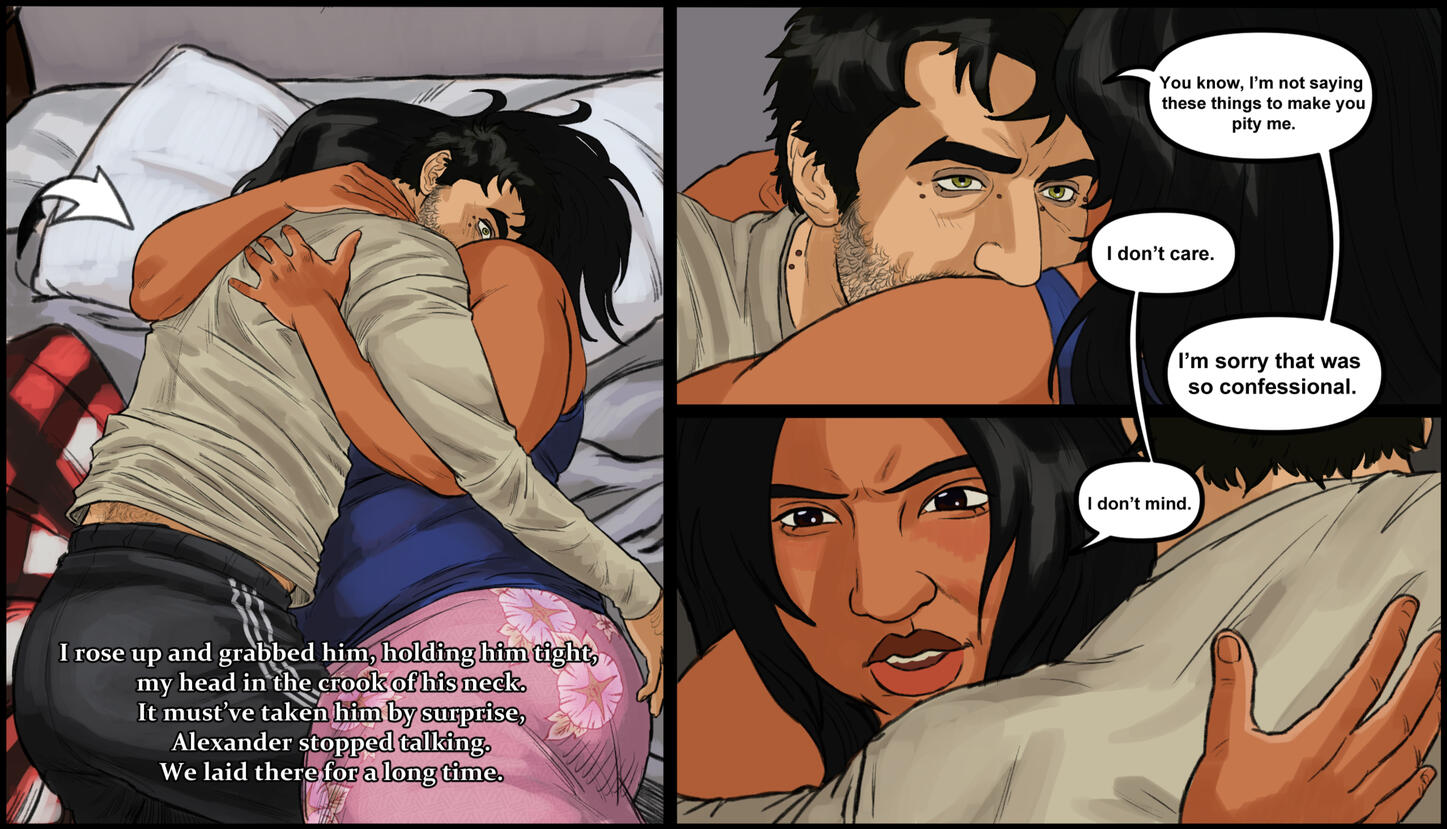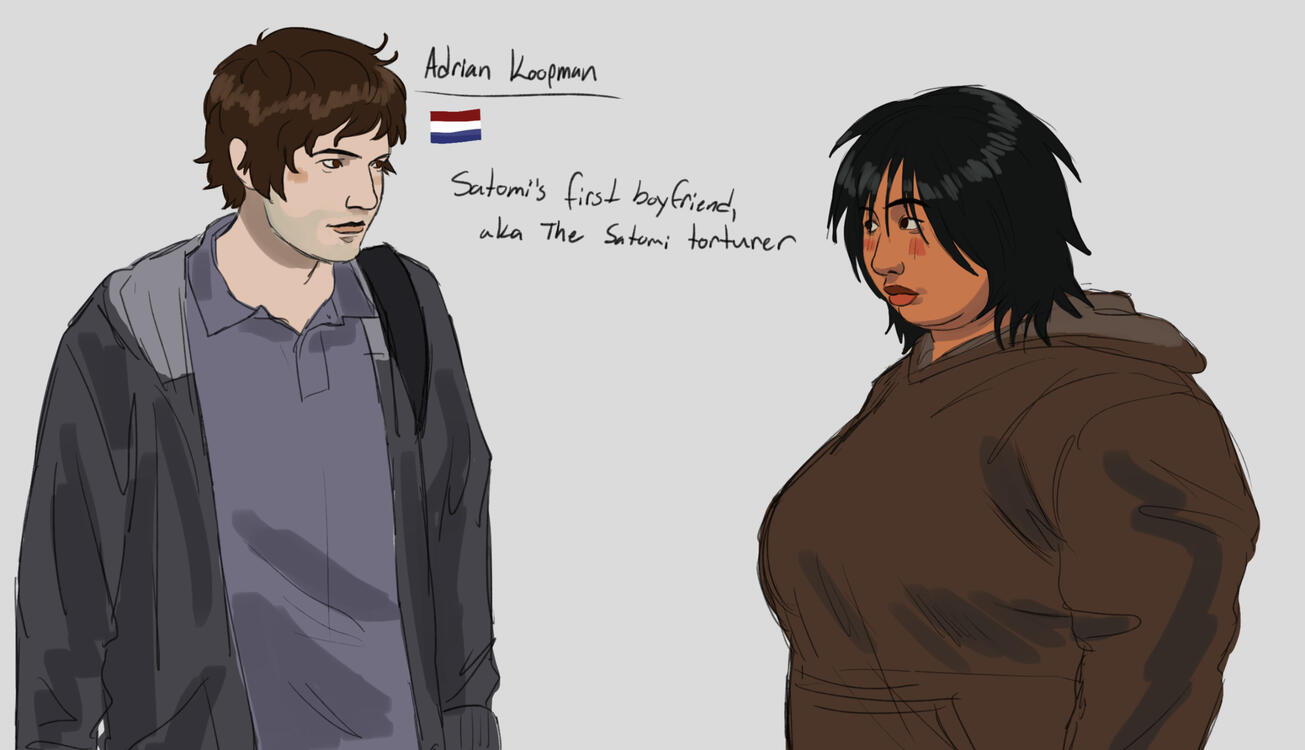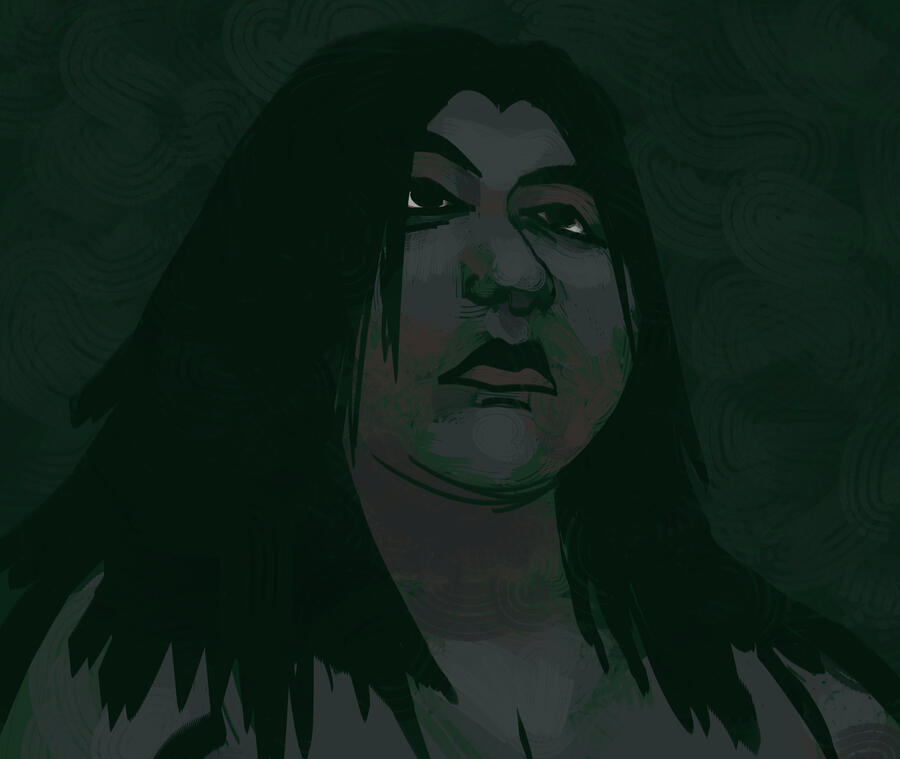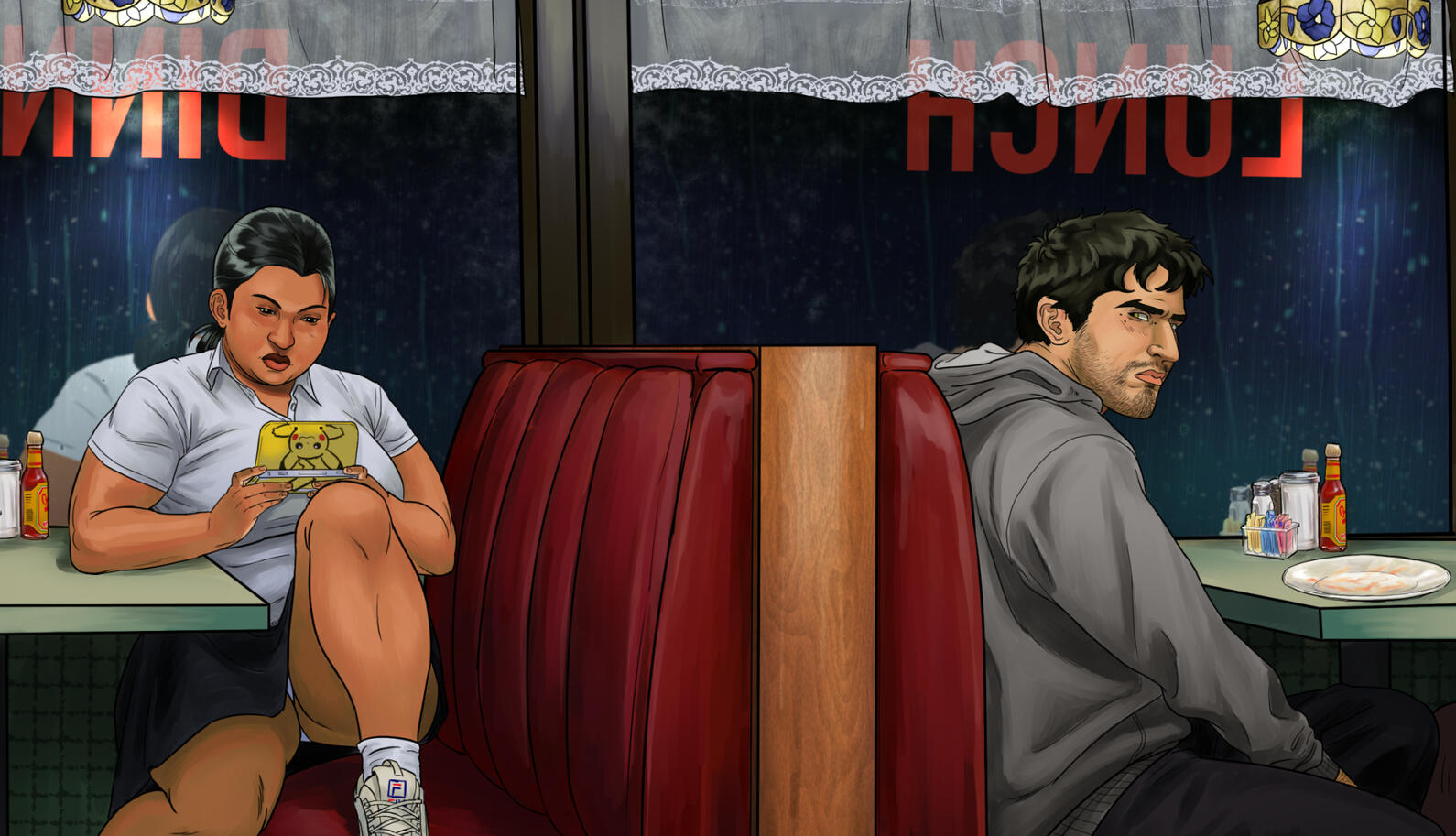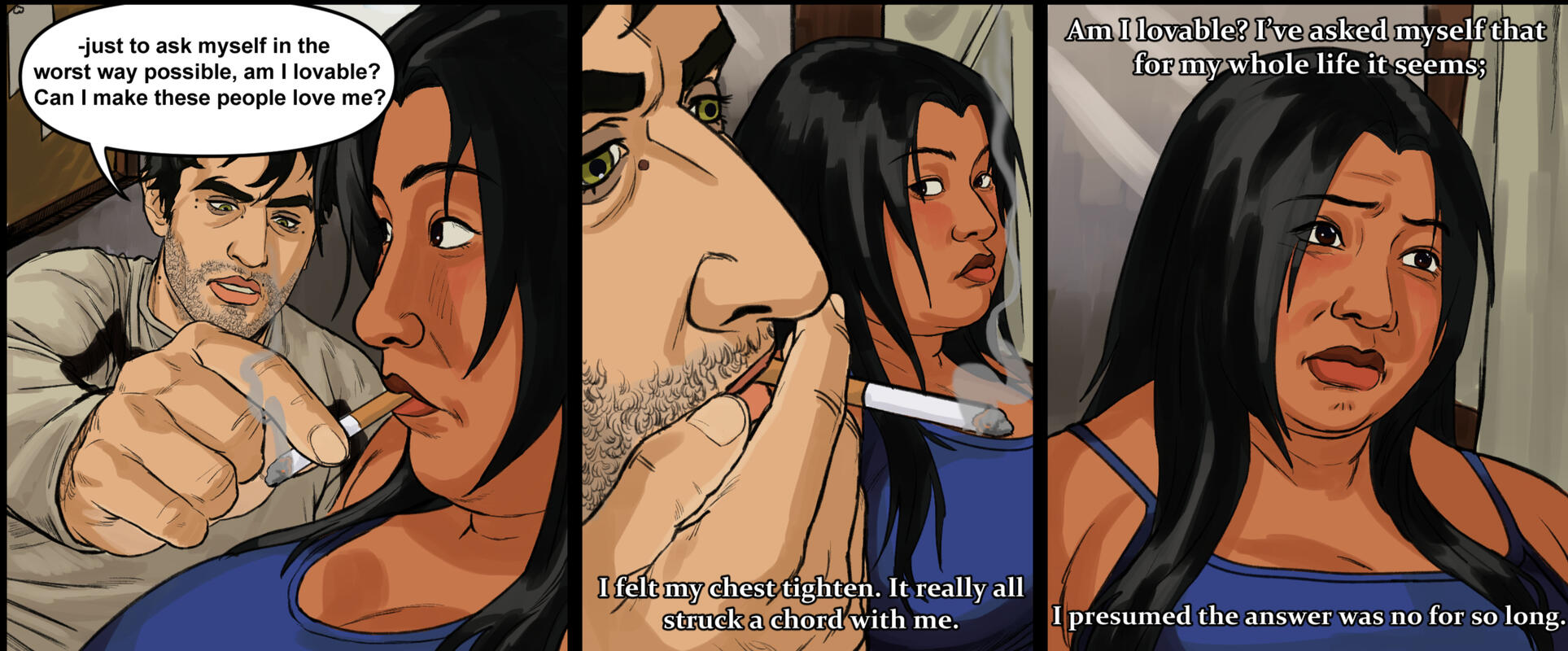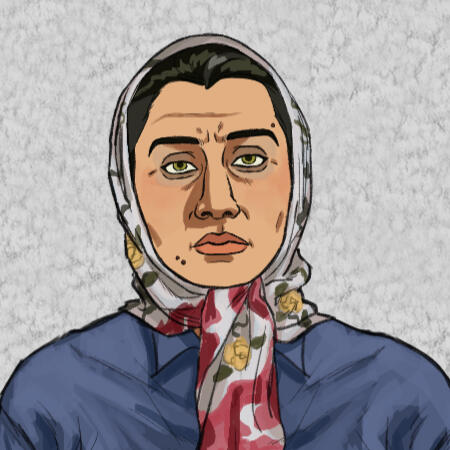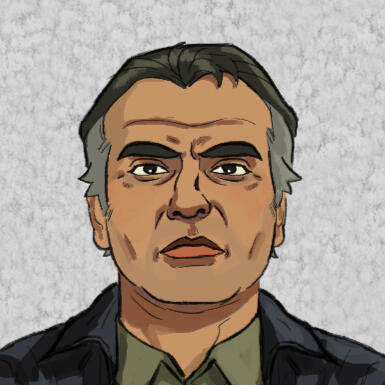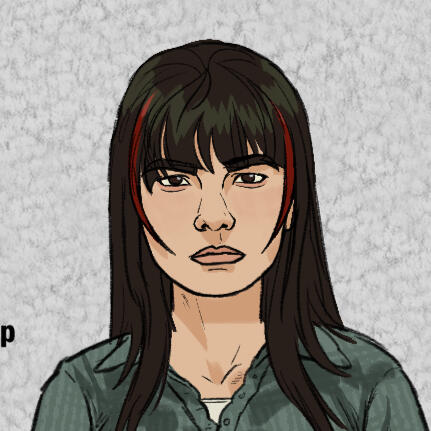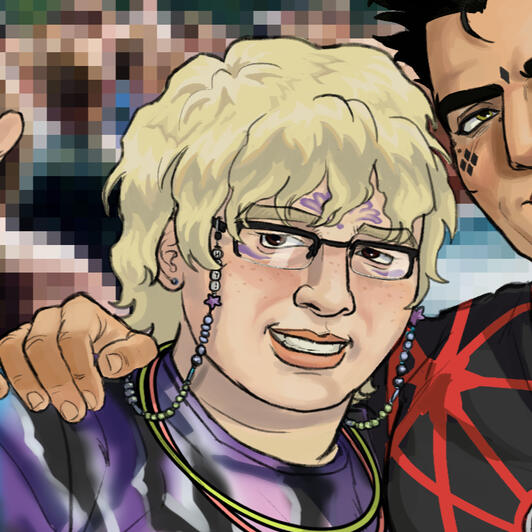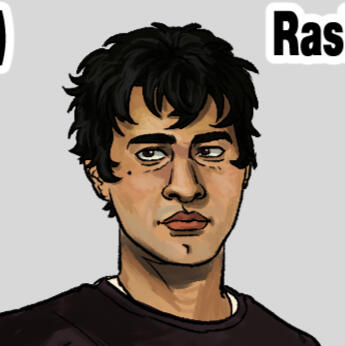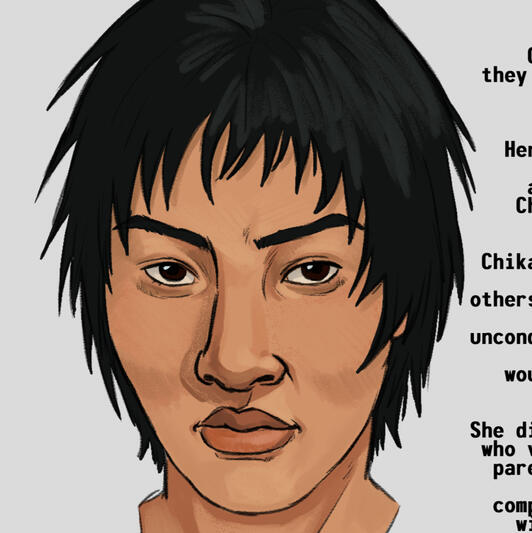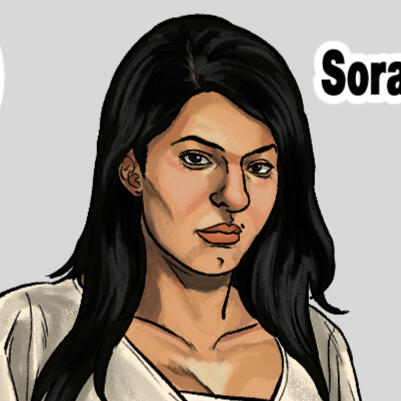DAS ALTE LEID
"The Old Sorrow"
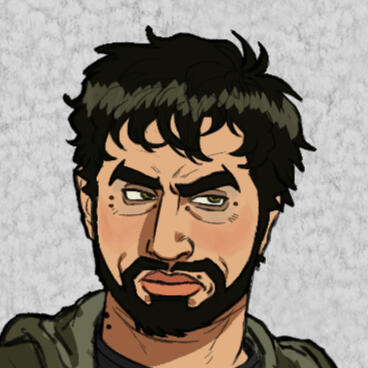
ALEXANDER "SASHA" MARKAZI
Iranian/Armenian - October 29th 1979 - ♏︎ - 5'10" - he/him - borderline
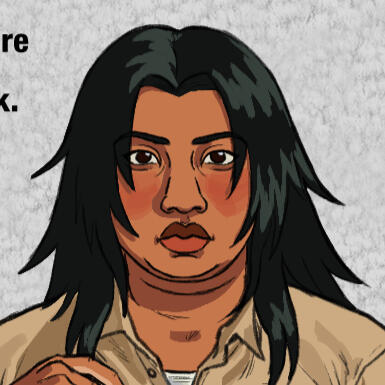
SATOMI TAMASHIRO
Ryukyuan/Polynesian - September 13th 1985 - ♍︎ - 5'5" - they/he/she - autistic
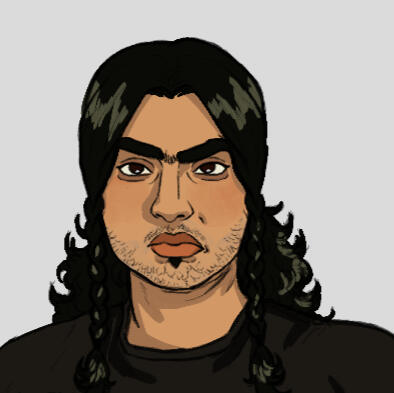
ANAHITA MARKAZI
West Asian/East Asian/Polynesian - July 20th 2016 - ♋︎ - 5'11" - she/he - autistic
Early Life-Monterey
Before Anahita was even born, problems arose in her life. She was an unplanned child who took her parents completely by surprise. Her parents are incredibly fearful to be parents, the example they had as their parents made incredibly damaging mistakes to their children. Satomi especially did not want to be a mother, being pregnant was a horrible, triggering time for her, and she was left severely depressed. Once Anahita was born, Satomi retreated to her room, and Sasha had to take on the role of both father and mother. When he was away, it was like Anahita had no parents. After enough neglect, Sasha takes Anahita away from their home and leaves Satomi temporarily, watching Satomi abuse their child in real time was to much to just simply reprimand her for.
This doesn't last for longer than two months, Anahita's parents are together again, Satomi left alone with just self-reflection was horrified to see themself turn into their own mother who was never there for them, and Sasha realized he simply can't live without Satomi. As a young child, Anahita would always be closer to her father, he was the one who was always there. Sasha refused to let his own troubled childhood be repeated for his own daughter and fiercely went out of his way to enforce that will. Satomi still felt immense guilt for their own absence and tries to make amends becoming more active a little later in Anahita's life, but the subtle rift between them is apparent. Anahita inherits Satomi's shy nature, and somewhat clings to her parents.
Schooling
Anahita is a shy yet energetic child who played in sports but was extremely temperamental. She'd often get into fights with other children who tried to make fun of her, mostly for being a tomboy. The older she grew, the more scrutiny she'd face for how masculine and angry she was. Anahita is very tall, almost 6', has a muscular build, and a very hairy face. She initially felt no shame for these things but hated the treatment she gets from her peers because of it. Her temperament alongside her shyness gained her very few friends once she was in high school.Her one friend that she liked more than simply just a friend was Cybil Acuña, who went by Kitty. Anahita even tried to befriend all of Kitty's friends, but to other girls, Anahita was a spectacle to behold, a giant laughingstock. She couldn't catch their insincere comments immediately; she just wanted to fit in somewhere badly. In a group of girls, Anahita tried to present more feminine even if it was uncomfortable, she'd do anything they say to have people she could call friends. Anahita couldn't realize that Kitty was the same, extremely insecure with her sense of self, and was ever changing aspects of her personality to fit in with others. Around these friends, Kitty was just as mean but was sweet in private.Everything is just so confusing. Anahita starts to just skip school to walk around outside and think. She takes up smoking during this time.
Teasing turned to active bullying; Anahita is some hairy ape girl, Anahita is some brute, Anahita can't be pretty if she tried-let's help her out.The hair removal prank goes horribly wrong for the perpetrators; the initial victim Anahita flies into a rage, beating down on whoever is nearby. Any chance to have friends now is down the drain, and now Anahita is expelled from school. It was a complete shock to her parents, who she did not like to disclose more personal aspects of herself to other than some sudden emotional outburst. Her father Alexander has her switch schools, so her senior year of high school was spent alone around new people she somewhat tolerated. She let her intimidating looks keep everyone at a distance from herself. At home, Alexander took on more of a drill sergeant persona in disciplining Anahita, harshly overcorrecting her behavior.
Adulthood
Cybil makes her way back into Anahita's life, her guilt couldn't keep her away. She apologizes all she can to Anahita, and it doesn't take much to be forgiven. Anahita is lonely, she'll take anyone.Cybil had always been determined to be independent from her family, having worked and drove since she was 16, and tries to convince Anahita to do the same. 'Don't you hate your parents too?' Anahita hates how stifling living with her father has become, feeling that all she does is disappoint, but she's still hesitant to leave.They're adults now and none of their old friends are watching, so Cybil takes her chance now to be with Anahita. In this time, they finally become real friends who can share their real feelings. They go to parties, they drink, Anahita drunkenly gets into more scuffles, they run away from trouble together. When they fail to run away one time, and Anahita is escorted home by police, her father Alexander is fuming. The ensuing fight about how Anahita is throwing her life away ends with her taking up Cybil's offer to leave her family and live with her. She doesn't talk to her father anymore, and calls her mother Satomi sometimes to ask how the pet lizard she left behind is doing.
Anahita has more internal struggles to go through. She's realized that her struggles with femininity was due to being transgender and now identifies as a trans butch. No, she didn't tell her family about this, and no, her cis girlfriend who has only dated cis men before doesn't understand this. The cracks in Anahita and Cybil's relationship start to show, they don't tell each other what they want from each other, especially Cybil. Anahita is confused again, she just feels ashamed of herself again, she can't please anyone in her life it seems. They don't last long as a couple, but they continue to live together for a few years. Anahita can't live the tension any longer, and more importantly, she must rekindle her relationship with her parents. Around the age of 23, Anahita swallows her pride and moves back home.
Early Life-Iran and Germany
Sasha was originally born Eskander Markazi in Tehran, Iran, son of Fatemeh Aghayev and Mirza Markazi. He lived only with his mother in an apartment for the first 5 years of his life, living at the brunt of the beginning of the War of the Cities until Mirza relocated them to East Germany in the later half of 1984. In their stop in Frankfurt, West Germany, Mirza has Eskander renamed to Alexander so he could more seamlessly integrate. He spends the rest of the year in school despite knowing little to no German and greatly struggles.In this time, his mother Fatemeh leaves him and Mirza to return to Iran in 1987. Alexander can't understand why, all he can see is the one person he always had who loved him leaving him, that he'd be alone with his father that he hardly knew. Fatemeh does not return, and it is the last that he sees of her. It was sudden and out of no where for the then 8 year old Alexander.
As an older child with only his father, Sasha is violent towards other children, never tries at school, and is difficult at home. He had very few friends to play with, and was otherwise poorly socialized. Acting out garnered little response from any of the adults in his life. Mirza doesn't know how to raise such a young child and work his factory job at the same time. Most of Sasha's meals end up coming from his neighbors.
Mirza and Jacek
Sasha and Mirza had never been close. Mirza missed a crucial time window when Sasha was a child, and he never knew how to connect to his son once Fatemeh had left. They spent the rest of Sasha's childhood borderline avoiding each other, interacting only when Sasha is caught stealing cigarettes or having his bedroom door removed due to his ill temperament. As an adult man, Sasha left as soon as possible to live with friends, and rarely ever went out of his way to speak to his father. Once Jacek had left for the US in 2007 and having no one to turn to, Sasha would move back into his father's apartment. At the beginning stumble into his downward spiral, Sasha has a verbal-turned violent confrontation with his father, breaking his nose and cracking two of his ribs. Sasha is immediately remorseful, but is disowned by Mirza. He's not the son he ever wanted, and Mirza is not the father he needed.
Jacek Müller was a boy who lived with his family a floor below Sasha in the same plattenbau building, and was the very first friend Sasha ever made. They were tied at the hip their entire childhood, each other's first love. Into adulthood, things started to change. Sasha would follow Jacek anywhere, he immediately left his father's home to live with him. Their relationship became very intense, Sasha clinging onto Jacek more like a child and a parent then two equal partners. They were in a constant cycle of Sasha overstepping what Jacek could tolerate, Jacek breaking their relationship off, Sasha finding someone else to wean off of, Sasha subsequently being dumped, and Jacek taking Sasha back out of feelings of guilt. Regardless of if Sasha was in a relationship with Jacek or not, he'd enter many flings and short-lived relationships to nullify feelings of being unlovable, which only became attacks on his own self esteem. Jacek knew this, he hated it, but he knew if he completely left Sasha, he'd fall apart completely.Jacek found what he thought would've been the easiest way to escape in 2007; a job abroad, in the Western United States, very, very far away from Alexander. He had went to university for computer science, and was offered a job in Silicon Valley that he gladly took. He left alone, leaving a very heartbroken Sasha behind. For at least a year, Jacek was free, but Sasha was going rapidly into a downward spiral. He ruined his last family relation, he has nothing left in Germany. Sasha sells most of his belongings and hops on the earliest flight to Jacek, who begrudgingly let him back in. After another year of the same old things, of Sasha not being able to hold a job longer than a couple months, of treating Jacek like a nanny, otherwise being a now 30 year old child, Jacek could not take anymore. Sasha is kicked out of Jacek's home and his life one final time.
Suicide Attempt and Surviving
Sasha's greatest fear was always abandonment. His parents abandoned him, the many lovers he took abandoned him, Jacek abandoned him. He was already entering a depressive state by the time Jacek ousted him, but it worsened tenfold once he was out on the street. Sasha would leave San Francisco in the night, driving down aimlessly in the unfamiliar country. He slept in his car, he owned only that. Sasha would live in a motel for the next few months onwards, working now as a grocery store overnight stocker. He lives alone for the first time in his life, completely isolated, he has no future. He doesn't need one, he is going to die. He doesn't eat because he doesn't need to, he is going to die.Sasha survives his suicide attempt thanks to a horrified building maintenance worker and is promptly hospitalized. After inpatient treatment and many outpatient therapy sessions, Sasha is ultimately diagnosed with having Borderline Personality Disorder.The year is now 2011, Sasha is 32 years old. He's set on keeping a job for longer than a year, now a night shift security guard. He's made new friends in the country now, namely another, slightly older, European immigrant named Sulejman Imamoviċ, who helps balance out Sasha's more impulsive nature. Sasha became his roommate after he lost the motel, and Sulejman got him a job that wasn't a fast food chain worker. Things are changing for the better now. In the early mornings when his shifts end, Sasha frequents a cheap nearby 24/7 diner where he becomes familiar to one of the overnight waitresses, a woman named Satomi Tamashiro. By the coming year the two of them are friends, Sasha doesn't mind Satomi's awkward mannerism, he finds them endearing. Satomi is someone he can speak his feelings to without being put into a 72-hour hold, he appreciates how supportive Satomi is. He helps build her confidence, as Satomi is originally very meek. Sasha is becoming a kinder person, a more caring person, and comes to realize that he loves her. Sasha and Satomi enter a romantic relationship in 2013, when he is 34 and Satomi is 28.
Early Life-Honolulu
Satomi is the only child of Chikako Tamashiro, a marine biologist from Okinawa, with no known father. She grew up in her uncle Ogata's home with his wife Haruno and daughter Jeanine. Ogata is the family patriarch and has a troubled relationship with his sister, mainly due to the two of them coming from a Catholic family in Okinawa, but Chikako left the faith and joined an Okinawan new religion, Ijun. This bled into Satomi's life growing up in his house, as the enmity towards his sister at times shifted towards his niece. Satomi's cousin Jeanine picked up the same behaviors and would antagonize and tease Satomi when they were younger children.When Satomi was 10 years old, she was diagnosed with Autism Spectrum Disorder and social anxiety. For the rest of her childhood, Satomi had very few friends, and typically found herself in escapist activities such as frequent forum scrolling or incessantly playing video games.Satomi and her mother did not see each other often, Chikako worked at a university and worked long hours, leaving Satomi with Ogata's family that more or less tolerate her and her mother. Satomi is chastised at home for her weight, her complexion, her strange mannerisms; she became a very easy target to punch down on, her uncle could make his traditional family look better than his sister's. She always wished her mother was there more to defend her. But Chikako is standoffish when she is present, and the two of them just don't know how to talk to the other. Satomi would remain the black sheep of her family.
College Dropout and NEETdom
Once Satomi graduated from high school she immediately took the chance to leave the family she lived with and applied to colleges on the mainland. Even though one of her major interests that she'd rather study was theology, she chose to go into marine science as to make a better connection with her mother. Satomi also saw the opportunity to "catch up with her peers" as she felt that she'd missed out on social milestones, mostly around having no friends, being in no prior relationships, and still being a virgin. In her classes, Satomi met a classmate in a similar situation, named Adrian Koopman. He took immediate interest in Satomi, and that's all she needed to hear.Dating Adrian meant constantly being asked about Japan and what it was like to be Japanese, which Satomi was, but not truly. Satomi and her family were Ryukyuan first and foremost, always. Hearing about Adrian's far off grandfather who was a Dutch merchant who went to Japan grows tired after the first few times. Being asked to speak Japanese for him after telling him she can't grows tired after the first couple times. Being expected to be a submissive girlfriend and cook him meals after school grows tired. Satomi began to wonder if hating your significant other was just normal, but the hate grew more and more, she hated simply being near him. To Adrian, Satomi was more akin to a living doll, a real life 'waifu', so it came as a shock when Satomi snapped at him and let all of her frustrations out, promptly dumping him.
Satomi would continue to try to date, praying that her relationship with Adrian was just one bad mistake. The more she tried, the more Satomi saw that she was either being used for some form of transaction, mostly her body, or that she was just seen as a woman. It bothered her greatly, to be a woman and be used because of that. Upon reflection, Satomi never even felt like a real woman, more so just playing the act of one so she could garner the attention of men, but it seemed like as if they knew she wasn't a real one. All of the building turmoil in Satomi's love life spilled over into every other aspect of her life, falling into depression, failing most of her classes, withdrawing from most social interaction in general. Stress would make her pull her hair out and bite on her arms. Satomi turned to alcohol to try to numb all of these feelings, but to no avail. Eventually she made the decision to just drop out of school entirely. It is 2007, Satomi is 22 years old.
Satomi did not wish to face her family back home, though. Go back and be told about how much time and money you wasted and become a laughing stock? It was months before anyone knew Satomi was no longer in college. She never moved back to Hawai'i, instead moving into a small and cheap apartment, using whatever money she had left saved for the most bare minimum necessities. Everyday was spent inside on the computer, browsing forum websites or just playing simulator games. The only friends Satomi had now lived in her computer.
Back into the Public
The NEET life was completely unsustainable when living alone, money runs out quickly. Satomi found a 24/7 diner that was hiring night shift positions and became a waitress. Face-to-face interactions seemed impossible now, all social interaction was a herculean task. Satomi became convinced that the people around them were putting on a front, that they all secretly despised them and at any minute would turn on them. They rarely ever speak to their coworkers during their shifts, every break they'd escape to their car to be on their phone or play on their DS. Everyone else noticed this and thought that Satomi was creepy.Several years later, a new regular comes in the earliest hours of the morning, a security guard getting off of work. There was something so familiar about him to Satomi, it was like she and him were the same. His face was very tired and sad, and Satomi would sometimes get a word in with him. More and more she speaks to him, more and more the man becomes more like a friend to her. His name was Alexander Markazi (but goes by Sasha), and seemed to also look forward to seeing her. By the coming year the two of them are friends, and Satomi feels more confident in interacting with people once more. In being around him, Satomi does some more self-reflection. She really admires him and just how brazen he is; Satomi wants to be like that herself; it almost becomes jealousy. It eventually strikes Satomi that its Sasha's masculinity and courage that she wants.
Sasha becomes very comfortable in Satomi's presence, to her surprise. He doesn't find her off putting like some others do. He confides his own feelings to her, something that's a first for Satomi, it made her feel cared for in a way she never felt before. Time comes where Satomi realizes Sasha loves her, and she does him too, in a way that felt truer and more sincere than from any time before. The pair enter a romantic relationship in 2013; Satomi is 28 and he is 34.
Gender Identity
Simply put, Satomi is a transgender man, but he'd been too cowardly to ever express himself in the way that he ever wanted too. Satomi had always very deeply taken other people's opinions in more consideration than his own feelings. At most, Satomi would tell trusted people about his preferred pronouns (He->They->She). He'd even go as far to roleplay as a gay male couple with Alexander.Satomi was resigned to live like this up until he and Alexander have their child Anahita when Satomi is 30. To Satomi, being a mother was surrendering to being just a woman, and it sent him into a deep depression. He was disgusted with what he was, how he would be reduced by everyone to be just a woman because of his status as a mother. After Satomi and Alexander's brief break up, Satomi finds the courage to attempt to live life as he's always wanted, lest he fall into the pit again.
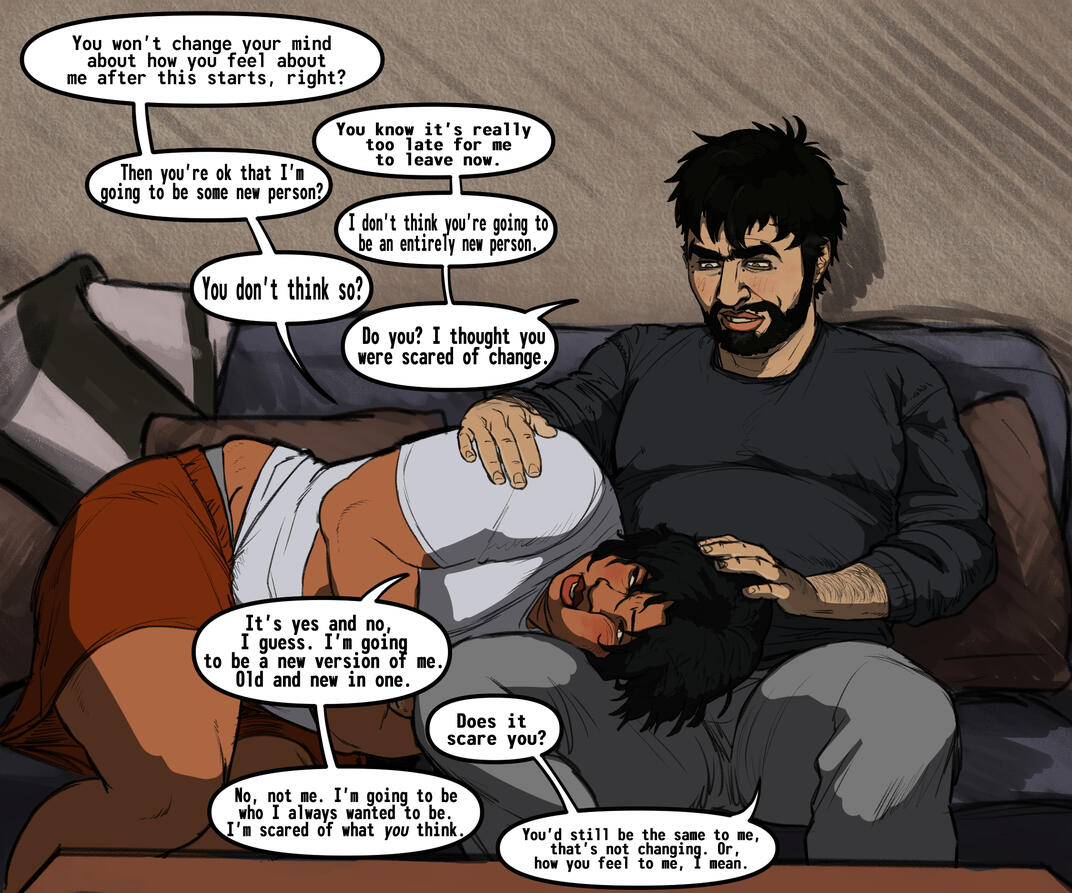
Satomi still wants personal aspects of their life to be private, so they kept their transition to themself, Alexander, and trusted friends. Satomi goes on a rather low dosage of testosterone when they're 33 years old and steadily takes it until they're around 35, and afterwards is on and off of T. There is a pleasure to be taken in even being able to shave their face, to let a mustache grow, see their body slowly morph into a different shape.
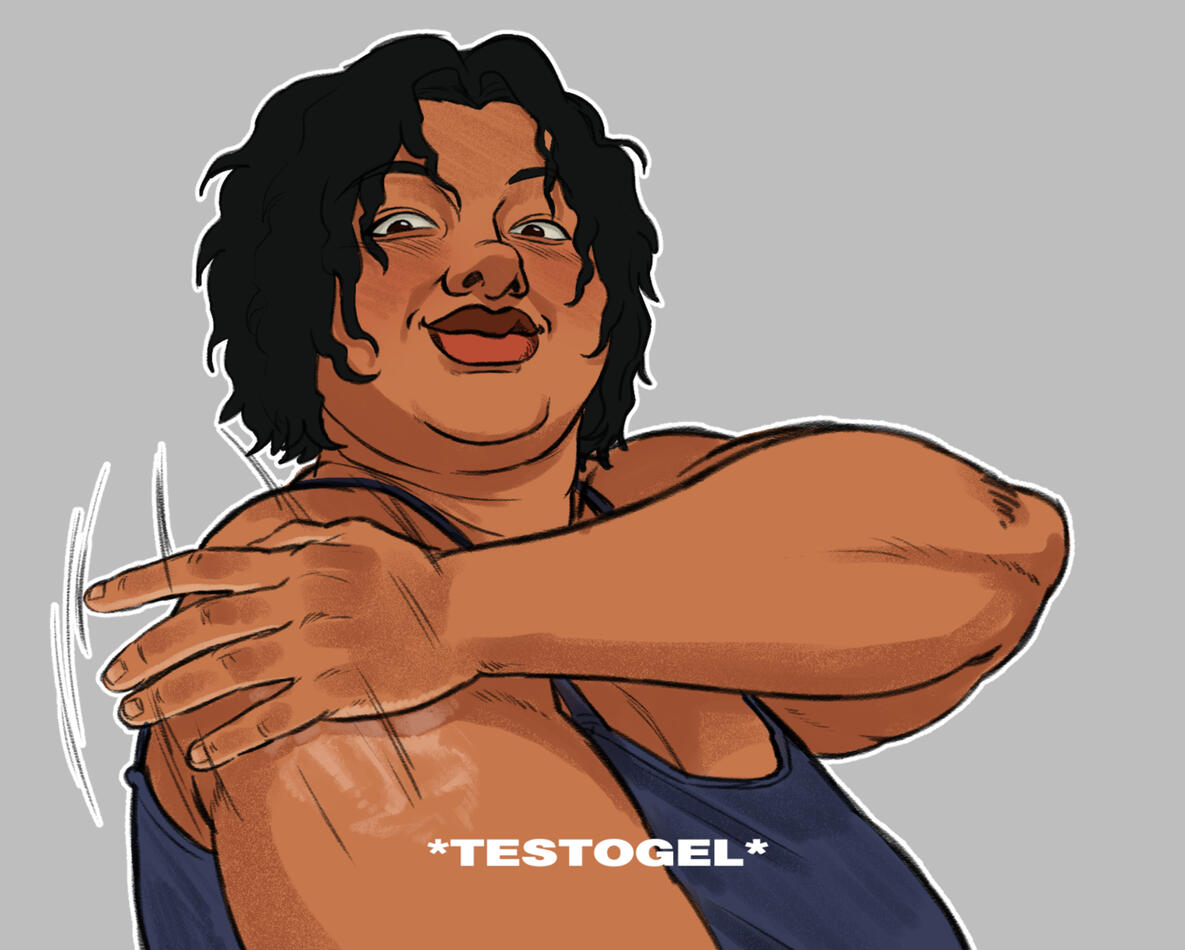
Fatemeh Aghayev
Born the fifth child of an Armenian mother and Tati father in Tehran, Fatemeh was a college student in 1977 studying art when she became a student communist. In 1978, she met Mirza, another student communist whom she'd have her first son with in 1979. Come the war in 1980, and Fatemeh is raising their son Eskander alone, Mirza seldom coming home to their apartment. Fatemeh relies on her parents to help her raise her son for years.
Mirza convinces Fatemeh to leave Iran with him to East Germany in 1984, claiming they'd be working with other politic exiles to bring aid to the communists in Iran who are now enemies of the state. Years pass, and they've lived simply as civilians. Fatemeh fears for the people she's left behind, and realizes that she is not in Germany to help liberate her homeland. She makes the ultimate decision to return to Tehran in 1987 but leave her son, renamed Alexander, in Germany due the ongoing war and regular bombings back home in Iran.
Back in Iran, Fatemeh works as a maid and is employed by a family with a son who is an Iran-Iraq War veteran, a younger man whom she marries and has two children with, her daughter Soraya and her second son Rashid.
Mirza Markazi
Middle child of a farmer's family in Saveh, Iran, Mirza ran away from home when he was 16 to live with his uncle, a member of the Tudeh Party in Tehran. He studied architecture in college and became a student communist. He met Fatemeh in 1978, and had a son with her come 1979. Once the revolution had ended, and the Islamic Republic now in power, Mirza would join the minority group of the Organization of Iranian People's Fedai Guerrillas in 1980. He smuggled weapons to Iranian Kurdistan and avoided spending too much time with Fatemeh and their son Eskander with the threat of execution over their heads.
By 1984, Mirza feared for his life, afraid of the ongoing war and the state, one or the other was going to kill him. He convinced Fatemeh to leave the country with him and their son to East Germany, claiming to work with other Iranian exiles. First they locate to Frankfurt, West Germany, where Mirza renames his son Eskander to Alexander to better fit in Germany. He has no intent on returning to Iran. They finally settle in East Berlin, East Germany, where Mirza and Alexander will stay.
Long after having disowned his son, Alexander returns to Germany to make amends. He knows Mirza has no one and wants him to live with him in the US instead, as he is his only family. Mirza is reluctant, but he does know he has no one; he leaves Germany with his son in 2020.
Jacek Müller
Jacek is the youngest of three children of a German father and a Polish mother. He took a liking to a boy who lived in the floor above him named Alexander, and stood by being his friend despite how troubled he was. They were attached at the hip for their entire childhood into adulthood, but the more toxic Sasha grew, the more Jacek wished he could cut him off. Jacek knew that it would break him, though. He tolerated as many of Sasha's harmful behaviors as he could, but just wished that he would just disappear one day. Once he took his job abroad, he really did feel free, finally able to be alone and be able to grow. Hearing just how much despair Sasha was in when he called him after Sasha had destroyed everything he had at home, Jacek couldn't help but feel at fault, and took him back in. The more Sasha started to undo everything Jacek had finally built for himself, the more confident Jacek became in finally cutting Sasha out for good. Once Sasha was finally out for good and Jacek's work visa was finished, he returned to Berlin and truly felt like he started living his own life.
Sulejman Imamoviċ
Sulejman is originally from Zenica, Bosnia and Herzegovina, originally Yugoslavia when he was born in 1977. The last years of his childhood were spent during the Bosnian War and Bosnian Genocide, during which his sickly older brother Hamza died due to the blockade against Zenica. The was ended when Sulejman was 18, and he was now the oldest son and primary provider for his family, as his father shared the same blood disease as his deceased brother. He worked in the factory his father had once before, until in 2009, aged 32, when he immigrated to the United States. He now lives in Monterey, California, and sends money back home to his mother and younger brother.
Sulejman and Sasha work as security guards in the same building together and are close friends. They met when Sulejman was looking for a roommate and Sasha had just lost the motel he used to lived in before his attempt. Sulejman feels deeply connected to him in the sense that Sasha is one of the few people he's met away from home who understands what it was like to live through war and lose loved ones.
Chikako Tamashiro
Chikako and her brother Ogata were both originally Catholics, their parents having recently converted after missionaries had made stop in Okinawa. It never seemed to fit for her; she did not like how the missionaries coincided with American joint occupation. When she was 14 in 1972, a new Shinto-Ryukyuan-derived religion called Ijun was founded, and it greatly took her interest. She especially was drawn to the inherent matriarchy of Ijun related to Okinawan priestesses, as opposed to patriarchal Catholicism. Her family did not approve of Chikako joining this new religion and abandoning their previous faith.
Chikako studied marine biology at the University of the Ryukus, and moved to Hawai'i in 1981 to study at the Hawaiʻi Institute of Marine Biology when she was 23, with her brother and his wife moving alongside her. Chikako's family was always pestering when she was going to finish school and start a family, so she decided to shut them up by compromising. She met a man at an Ijun temple and had his daughter, who she named Satomi, in 1985.
Chikako was very distant with Satomi; she was consumed by her work and left child rearing to her brother and sister-in-law. She eventually moved out to live closer to work and saw Satomi even less when she was around 13 years old.
Cybil "Kitty" Acuña
Cybil was born in and originally from Phoenix, Arizona. It had always just been her and her mother and sister; her father was never around. Her parents divorced when Cybil was 11 years old, after which her mother moved them to California. Her father was white, and her mother was white and Chiricahua Apache. She never really had a lot of friends and was very lonely at first, but by the time she was in high school, she learned that by conforming to whatever group of people she knew, they would accept her. She knew that it was technically all fake, she knew that when she tried to let Anahita in, Anahita couldn't do the same. Cybil knew it was wrong to join in on hounding her, but she never wanted it all to be turned against her.
When she and Anahita start to date, it's soon clear that they didn't have much chemistry to begin with. She doesn't understand Anahita's identity as being transmasc but not being a man, and she doesn't communicate her own wants from Anahita, she just expects her to just intuitively know. Anahita feels more and more embarrassed with himself the longer he dates her, but Cybil won't let him go. Cybil, rather ironically given how much she fought to leave her mother, hates to be alone. Even after they broke up, Cybil convinces Anahita to still be her roommate, she doesn't even care how awkward it is.
Soraya Ghassemi
Soraya is the second child of Fatemeh and the first child from her first official marriage with a man named Ibrahim Ghassemi. Her father was a disabled war veteran who did everything in his power to spoil his little girl. Her childhood was relatively uneventful up until the sudden passing of her father when she was 16 in 2006. If she wasn't distraught enough, her mother having a sudden personality change wasn't helping. Fatemeh became very frightened at the mere thought of loosing another family member, and started to be overly attached and almost possessive of Soraya. She suddenly had a strict curfew, she suddenly had to be constantly calling home if she ever went out with friends. By the time Soraya was college aged in 2008, she went into nursing school, but before she even graduated Soraya had already gotten married. Her mother chastised her for not finishing school first, but Soraya wasn't hearing it; she didn't care, she just wanted to be as far away from her mother as possible, and gladly moved away with her new husband.
Soraya would get divorced in 2016, her husband fed up with how she refused to have children and Soraya was fed up with how he keep trying to bribe her for affection with material gifts and use it as a means to hold against her; everything she owns was technically his. She ends up back to where she started, living with her mother again after barely speaking to her in the last 8 years. Fatemeh in this new opportunity tries to bond with her daughter, but doesn't get very far.
Rashid Ghassemi
Rashid is Fatemeh's third child and second son, born in 1992, his older sister being born in 1990. Fatemeh always babied her son, frequently doting on him. His father Ibrahim, having been drafted into the Iran-Iraq war as a young man, detested almost every single form of violence and conflict, and made it a point to teach his children to avoid being aggravators and to learn peaceful conflict resolution. Rashid took this a step forward in the wrong direction, and avoids all form of confrontation and is somewhat cowardly; if you need him to step up for you, he'll never pull through. Ibrahim died when Rashid was 14 years old in 2006, and since then he has been aimless in the direction of his life. He shared the strict rules his older sister Soraya was under, but it didn't affect him much, he didn't have anywhere to go.
He went to college for a brief amount of time, but yet again went in completely aimless, and quickly dropped out and moved back in with his mother. Fatemeh needed the company though, as Soraya married herself away to avoid her mother. His company slowly turned sour though, as his aimlessness never made it that he wondered into employment. 4 years later, and Fatemeh is reunited with both of her unemployed children who live at home.
